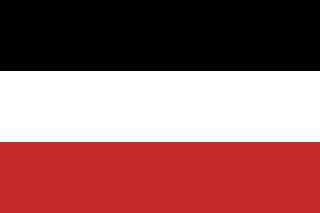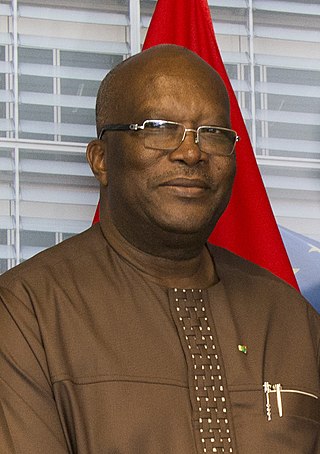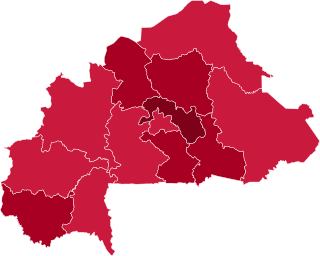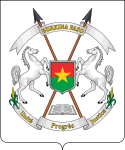
Burkina Faso is a landlocked country in West Africa, bordered by Mali to the northwest, Niger to the northeast, Benin to the southeast, Togo and Ghana to the south, and Ivory Coast to the southwest. It covers an area of 274,223 km2. In 2021, the country had an estimated population of approximately 23,674,480. Previously called the Republic of Upper Volta (1958–1984), it was renamed Burkina Faso by former president Thomas Sankara. Its citizens are known as Burkinabè, and its capital and largest city is Ouagadougou.

The Politics of Burkina Faso takes place in a framework of a semi-presidential republic, whereby the Prime Minister of Burkina Faso is the head of government, and of a multi-party system. The President of Burkina Faso is the head of state. Executive power is exercised by both the President and the Government. Legislative power is vested in both the government and parliament. The party system was dominated by the Congress for Democracy and Progress (CDP) until 2014. Burkina Faso's CDP fell victim to a series of demonstrations and riots, to alter the constitution and extend the former president's term in office - referred to as the 2014 Burkinabé uprising. The military then declared itself to be in power and the state shifted to an electoral autocracy. Burkina Faso lacks the foundation that would support a democracy, with its current transition to a military regime, but not all hope is lost. After an internal coup ousted Paul-Henri Sandaogo Damiba, the previous military head of state, a new transitional charter was adopted, naming Captain Ibrahim Traoré as president. Mr. Damiba's progressional failures on the state's security front “swung a majority of domestic opinion in favour of the MPSR”. Mr. Traoré pledged a major reinforcement of armed forces to strengthen frontline units and recruited over 3,000 more troops. As the violence becomes so entrenched, it is nonetheless expected that the security situation will remain dire in the medium term. “However, we expect that elections will still be held in 2024 as part of the army's plan to stabilise the security situation by boosting counter-terrorism operations.”

The history of Burkina Faso includes the history of various kingdoms within the country, such as the Mossi kingdoms, as well as the later French colonisation of the territory and its independence as the Republic of Upper Volta in 1960.

The Republic of Upper Volta was a landlocked West African country established on 11 December 1958 as a self-governing state within the French Community. Before becoming autonomous, it had been part of the French Union as the French Upper Volta. On 5 August 1960, it gained full independence from France. On 4 August 1984, it changed its name to Burkina Faso.

Blaise Compaoré is a Burkinabé-Ivorian former politician who served as the second president of Burkina Faso from 1987 to 2014. He was a close associate of the first president, Thomas Sankara, during the 1980s and in October 1987 he led a coup d'état during which Sankara was killed. Subsequently, he introduced a policy of 'rectification', overturning the leftist and Third Worldist policies pursued by Sankara. He won elections in 1991, 1998, 2005, and 2010, in what were considered unfair circumstances. His attempt to amend the constitution to extend his 27-year term caused the 2014 Burkinabé uprising. On 31 October 2014, Compaoré resigned and fled to the Ivory Coast. In April 2022, he was found guilty by a special military tribunal of complicity in Sankara’s murder. He is the longest-serving president of Burkina Faso.

Burkina Faso elects on the national level a head of state – the president – and a legislature. The president is elected for a five-year term by the people. The National Assembly has 127 members, elected for a five-year term by proportional representation. Burkina Faso has held democratic elections since 1965. The history of elections has been slightly inconsistent, with the government dynamically changing at the hands of various coups, constitutional changes, and boycotts from various political parties. In 2015, the country experienced its first peaceful and fair election ever. Corruption plagued Burkina Faso's presidential elections for 50 years, but following a coup overthrowing Blaise Compaoré, the nation has seen more democratic and less corrupt electoral processes. Terrorism has played a substantial role in Burkina Faso's elections, with candidates running on the promise to keep the nation safe from the rise of Islamic jihadism they experienced in the 2010s. Historically, a few different parties have held power in Burkina. The Organization for Popular Democracy – Labour Movement was former president Compaoré's party affiliation, and thus they held power from 1987 to 2014. His party took power through a coup, and in 2014 also lost their control when the Regiment of Presidential Security overthrew the government.

Roch Marc Christian Kaboré is a Burkinabé banker and politician who served as the President of Burkina Faso from 2015 until he was deposed in 2022. He was the Prime Minister of Burkina Faso between 1994 and 1996 and President of the National Assembly of Burkina Faso from 2002 to 2012. Kaboré was also president of the Congress for Democracy and Progress (CDP) until his departure from the party in 2014. He founded the People's Movement for Progress party that same year.

Presidential elections were held in Burkina Faso on 13 November 2005. Incumbent president Blaise Compaoré was re-elected with around 80% of the vote.
Articles related to Burkina Faso include:

Parliamentary elections were held in Burkina Faso on 24 May 1992. They were the first parliamentary elections held in the country since 1978, and the first to be held under the 1991 constitution. The result was a victory for the Organization for Popular Democracy – Labour Movement, which won 78 of the 107 seats in the National Assembly.

Parliamentary elections were held in the Republic of Upper Volta on 20 December 1970, following the restoration of multi-party democracy in a referendum earlier in the year. The result was a victory for the former sole legal party, the Voltaic Democratic Union–African Democratic Rally, which won 37 of the 57 seats in the National Assembly. Voter turnout was 48.3%.

Parliamentary elections were held in Upper Volta on 30 April 1978. They followed a constitutional referendum the previous year, which came about as a result of the 1974 military coup. A total of 367 candidates contested the elections.

Presidential elections were held in Burkina Faso on 15 November 1998. They were boycotted by the major opposition parties and resulted in a victory for incumbent President Blaise Compaoré. Voter turnout was 56.1%.

Parliamentary elections were held in Burkina Faso on 11 May 1997, after the National Assembly completed its first full term since independence. The result was a victory for the Congress for Democracy and Progress, which won 101 of the 111 seats in the National Assembly. Voter turnout was just 44.1%.

A constitutional referendum was held in Burkina Faso on 9 June 1991. It followed the 1987 military coup, and would restore multi-party democracy. The new constitution retained the presidential system of government, created a bicameral parliament, and limited the President to two seven-year terms. It was approved by 92.83% of voters with a 48.8% turnout.

Parliamentary elections were held in Burkina Faso on 2 December 2012. They were the first elections held since the National Assembly dissolved the National Electoral Commission in 2011, following fraud allegations concerning the 2010 presidential elections. Municipal elections for over 18,000 councillors were held simultaneously. The elections were held amidst a period of political uncertainty, following protests against President Blaise Compaore's regime.

General elections were held in Burkina Faso on 29 November 2015. These were the first national elections in the country since the 2014 Burkinabé uprising and the departure of President Blaise Compaoré, who had ruled Burkina Faso for 27 years. Compaoré's political party, the Congress for Democracy and Progress, was banned from presenting a presidential candidate in the presidential elections but was still able to participate in the parliamentary election.
The 1966 Upper Voltan coup d'état was an event which took place on 3 January 1966 in the Republic of Upper Volta, when following large-scale popular unrest, the military intervened against the government. This forced President Maurice Yaméogo to resign, and was replaced Lieutenant Colonel Sangoulé Lamizana. Lamizana would go on to rule until 1980, when yet another military coup d'état overthrew him. The 1966 coup would prove to be the first in a long line of Upper Voltan and later Burkinabé coups, which marked the beginning of half a century of military rule.

Chamber of Representatives of Burkina Faso was the upper house of the bicameral legislature of Burkina Faso from 1991 to 2002.

Ibrahim Traoré is a Burkinabé military officer who has been the interim leader of Burkina Faso since the September 2022 coup d'état that ousted interim president Paul-Henri Sandaogo Damiba. At age 36, Traoré is currently the second youngest serving state leader in the world after Icelandic Prime Minister Kristrún Frostadóttir, and the youngest serving president.







